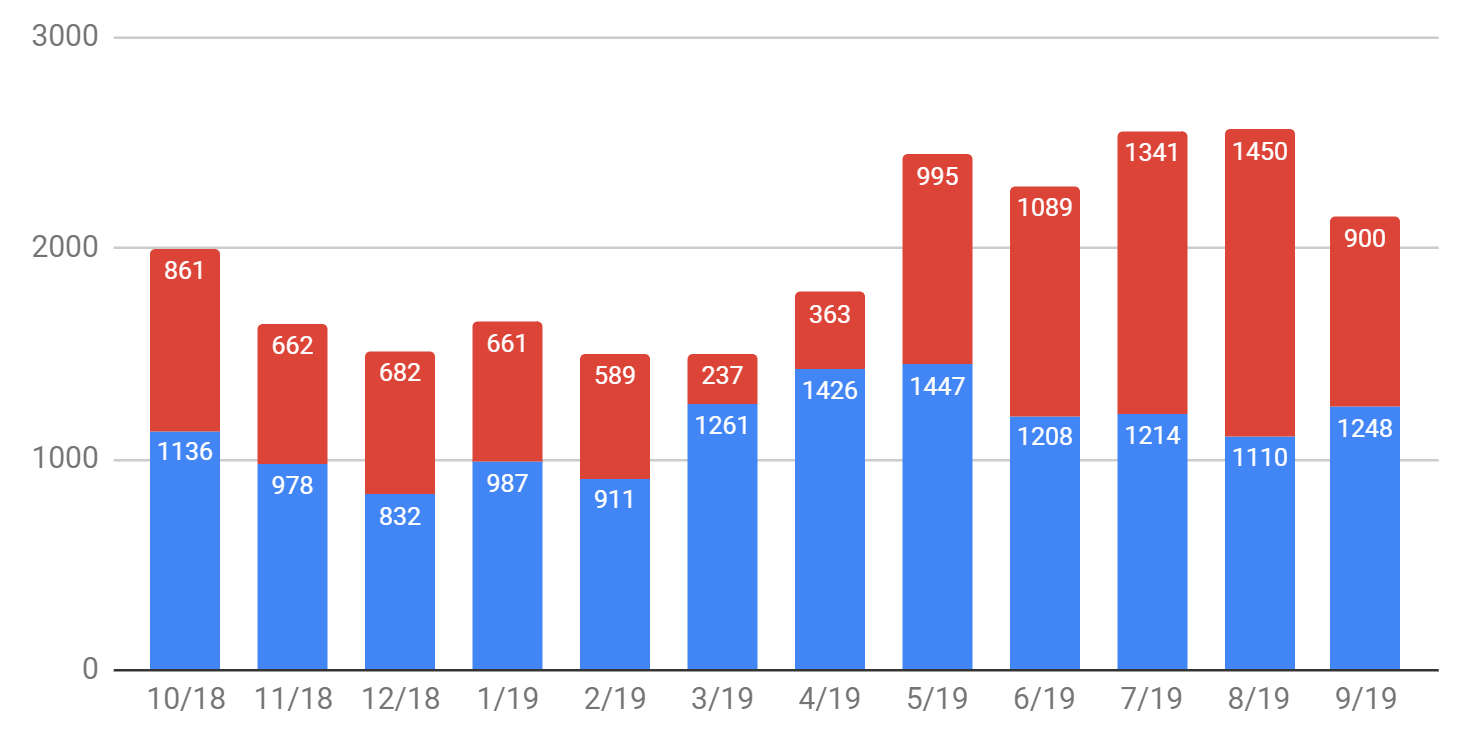Our energy consumption in the last year
posted by Jeff | Thursday, December 5, 2019, 11:15 PM | comments: 0I think about energy a lot. In most of the world, energy consumption is connected to carbon emission, which is causing climate change at a frightening rate. Science gives no fucks about whether or not you believe this. Facts are still facts. If you trust politicians over scientists, I question your judgment. We've been on something of a quest to see if we could change our own contribution to this mess, and unintentionally have done so in the context of not significantly changing our lifestyle.
This experiment is largely attached to the bigger things in our immediate control. For example, I can control decisions about having solar and electric cars, but I can't control the carbon impact of the supply chain that gets groceries to Publix. I'm not convinced that it's possible for individuals to have massive impact in this way, and that it takes a wider effort with a carbon tax or other disincentive to do things in a non-sustainable way. (If you don't believe that would be effective, tell me about how tobacco use has gone the last half-century.)
Our first change began more than five years ago when we leased our first EV. We fully committed nine months after that, and we bought our last gallon of gas about four and a half years ago. The price of electric vehicles has decreased continually in this time. Looking at it strictly from a range perspective, our first Nissan Leaf in 2014 cost about $642 per mile (if you were buying outright and there was no tax incentive). In 2018, the Tesla Model 3 cost about $161 per mile. That's fairly radical change in a short period of time. Economy of scale will keep forcing that down. I've written elsewhere about why driving an EV is something we can all do if cost was not a factor.
In the summer of 2018, we installed solar on our roof. We felt this was pretty necessary because it's an unnecessarily large house for three people. Mind you, it's very lived in, I work from home some percentage of the time, Diana has her quilting studio and Simon spreads out because he's 9. But still, we could live in less. All that space requires a lot of air conditioning, and we use as much as 2,500 kWh during the hottest months (about 400 of that is for the cars). It's a 10kW system, which isn't enough to cover our usage over the course of a year, factoring in net metering. (What that means is that the excess we generate during the day feeds back into the grid, and we're charged for what we pull minus what we push.) We have a good snapshot now of what our yearly cycle looks like. The red is net pull from the grid, the blue is the solar part.
This works out to about 57% solar. If you removed the car component, which is about 5,000 kWh per year, we would cover 75% of our usage per year. Realistically, we could have spent more on a 12 or 14 kW system, but our roof angles aren't ideal enough for that. Buying a smaller house would have been the better play! Still, given current electric rates, our return-on-investment period, basically the time required to recoup the cost of the solar system itself by the power it generates, is about 9 years and 4 months, after which the power is "free."
It's a little tricky to figure out the impact of driving the EV's relative to the electric generation, but consider this. An EV already reduces the yearly carbon output by 3 or 4 metric tons per car, and we have two of them. Now, a little less than half of the electrons going into the cars comes from the electric utility, which is at least 85% powered by fossil fuels. However, as I've written previously, economy of scale for that electricity generation results in at least two-thirds less carbon emissions per mile, so accounting for our solar generation in that, we're looking at a reduction of emission by at minimum 85% by driving EV's that get more than half of their power from the sun. That's huge.
The biggest takeaway from all of this is that the technology exists today to live our lives on sustainable energy, and the cost difference to do so is closing so fast that the only thing preventing us from getting to 100% is the utility and fossil fuel lobby. Our next door neighbor, Walt Disney World, is now 50% powered by solar. Kauai gets 90% of its daytime power from utility scale and individual solar, and with battery power and more installations, improves every year. The change will happen, it's just a question of whether it will happen fast enough to change the path of climate change that will put Miami under water and Europe into longer winters.
Distributed generation is such an obvious future. I wish states would incentivize developers to do solar and battery plots in each new subdivision. Can you imagine how robust power could be if it didn't require thousands of miles of wires to get power to you? We've got the transportation thing figured out, even if it isn't widely adopted yet, so widespread renewable generation is next. Costa Rica gets nearly all of its electricity from renewables, but unfortunately hasn't cracked the oil consumption from transportation.
Comments
No comments yet.
